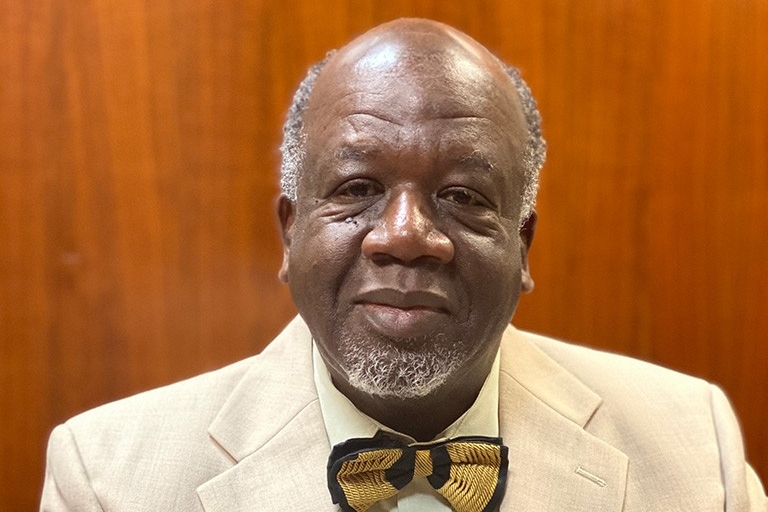How alumnus Patrick Brown became a pillar of Burlington, Vermont
 “The more that time passes, the more I appreciate how Concordia shaped who I am. I’m very grateful for the experiences and opportunities that I had there,” says Patrick Brown, BA 82.
“The more that time passes, the more I appreciate how Concordia shaped who I am. I’m very grateful for the experiences and opportunities that I had there,” says Patrick Brown, BA 82.
University lecturer. Arts and culture ambassador. Restaurant owner.
For the past four decades, Patrick Brown, BA 82, has used his multifaceted skills to foster community, advocate for social justice and build a better Burlington, Vermont.
Born and raised in Jamaica, Brown’s educational journey took him to Montreal and Concordia in the 1970s, where he majored in English.
In the wake of the 1969 Sir George Williams affair — a protest largely led by Caribbean students against institutional racism — the decade was a period of significant social tension, and Brown faced considerable challenges.
Despite this, he emerged as an influential and recognizable figure at Concordia and within the city’s West Indian diaspora.
Brown became deeply involved in student government and the student senate. He also broke ground as the first Black editor of The Link as well as the Concordia student yearbook.
“I was often the only non-white person to have a seat at the table, and did my best to lobby for change,” reflects Brown.
His role on campus went beyond activism.
As a support figure for international students, Brown guided peers through onerous immigration paperwork and helped facilitate access to crucial support networks at Concordia and beyond. He was also a deejay on student radio who played classical and reggae music on CRSG 89.1, the precursor to CJLO.
To the state capital
Much of what Brown accomplished at Concordia — forging ties, volunteering, leading initiatives — presaged the life he would create for himself south of the border.
Brown arrived in Vermont somewhat by chance.
“St. Michael’s College held a recruiting session at Concordia,” he recalls. “They did an excellent job marketing the school, and the next thing I knew, I was in Colchester pursuing graduate studies.”
Brown earned his master’s in educational administration from St. Michael’s and followed that up with a graduate certificate from Harvard University.
In Burlington, where he ultimately settled, Brown has made a significant impact as an educator, community leader and business owner.
At the University of Vermont (UVM), he has taught courses on race and racism in the United States, Caribbean culture and music, and more. He has also served as a faculty director of UVM’s Africa House and Caribbean House.
Frequently in demand as an advisor, Brown has contributed his time as a board member to the likes of Burlington College, the Fletcher Free Library, the Vermont Council on World Affairs and the Vermont State Board of Education.
In 2012, he ran for the Vermont State Senate as an independent candidate.
Through his own resourcefulness, Brown has also attracted a number of extraordinary figures to Burlington to deliver talks. These include Nobel Peace Prize laureate Archbishop Desmond Tutu and, most recently, author Isabel Wilkerson, the first Black woman recipient of a Pulitzer Prize for journalism.
Brown’s efforts to improve his adopted city and state have not gone unnoticed.
His honours include a Distinguished Scholar Award from the Vermont chapter of the National Society of Collegiate Scholars, and a Community Impact Award from the United Way of Chittenden County.
St. Michael’s conferred Brown with an honorary doctorate in 2021 for his anti-racism activism throughout Vermont. In 2023, he received the City of Burlington Legacy Award.
Restaurant owner
Brown’s impact on Burlington does not end there.
From 1992 to 2013, he owned and operated Caribbean Buffet, a fixture of Burlington’s civic life and a regular haunt for local politicans like Bernie Sanders.
“It was a community hub, and a place where I could advocate for racial equity and support local causes,” Brown explains.
“I was inspired by Lloyd Tull’s Caribec in N.D.G., a restaurant not far from Loyola Campus that was such an important touchstone for Montreal’s West Indian community.”
Despite his busy life in Burlington, Brown is strongly connected to Montreal and to members of the Concordia community (former Board of Governors chair Norman E. Hébert, BComm 77, notably, is a friend).
“I still follow what’s happening in Montreal, especially in the Black and Caribbean communities,” Brown says.
“I read Montreal Community Contact [founded by the late Egbert Gaye, BA 89] and stay in touch with people like Gemma Raeburn-Baynes, founder of Taste of the Caribbean.”
With his courseload at UVM, his board memberships and his organizational efforts to invite distinguished speakers — and even operatic and classical music ensembles — to Burlington, Brown has no plans to retire quietly.
You can almost say it’s in his blood.
“My mother, who lives in Westmoreland Parish, Jamaica, is alive and well at 104,” he says. “When I was a student in Montreal, she came up to visit. She was afraid of the metro — I will never forget that. However, Concordia made a big impression on her, and she still talks about Sir George Williams Campus to this day.
“The more that time passes, the more I appreciate how Concordia shaped who I am. I’m very grateful for the experiences and opportunities that I had there.”